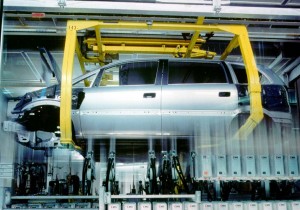General Motors’ long-troubled Opel subsidiary plans to close an unneeded plant in Bochum, Germany by the end of 2014, a move that will come several years ahead of its original plan thanks to a major misstep by the powerful metalworkers union IG Metall.
The move could be critical as Opel moves to speed up a broad restructuring strategy aimed at capping what is likely to be a 15th year of massive losses that have led some analysts to call on GM to close or sell off its European operations.
Opel is just one of a number of European makers aiming to rein in excess capacity at a time when the Continental auto market has sunk to its lowest level in decades – Ford, for example, will shutter two British facilities and a larger plant in Belgium in 2014. But the closure of Bochum, where 3,000 are currently employed producing models like the Zafira van, would mark the first time a major auto plant has been shuttered in Germany since the end of World War II.
The move can be seen as a slap at both IG Metall, which has resisted most of Opel’s plans to trim costs and bring capacity in line with demand, and the Berlin government of Angela Merkel. While her administration has lent support to other German-based manufacturers, it notably snubbed GM’s request for help following the U.S. maker’s bankruptcy in 2009.
GM Vice Chairman Steve Girsky, who has spearheaded the effort to lay out a functional turnaround plan, originally called for closing the Bochum plant when its current product program ended. But Opel reached a tentative compromise with its union that would have kept operations going on a smaller scale, with workers also accepting a pay freeze. That deal was rejected by Bochum’s hourly workers last month.
There could still be room for IG Metall and for the German government to try to get GM to back down though the maker’s decision now appears firmly in place. Nonetheless, it could create a backlash in Germany where Opel’s image has been tattered in recent years. The maker has been struggling to regain a reputation for competitive products and has recently scored modest successes with its small Adam and Mokka models.
In meetings last week with both the German government and Opel employees, GM’s senior management outlined a turnaround plan that will be backed by $5 billion in new investments. The maker plans to add 23 new models over the next three years, along with an assortment of new powertrains.
(For more on GM’s $5 billion European investment plan, Click Here.)
But GM is also building up its Chevrolet brand which some analysts believe could eventually replace Opel if the German-based subsidiary fails to reverse losses that, as of last year, have come to $18 billion. If fact, the red ink deepened from $700 million in 2011 to $1.8 billion in 2012.


Considering all the money GM has made via the U.S. auto loan program that they never fully repaid and the profits they actually invested in China instead of the U.S., I’d say the German government is right to NOT support unscrupulous GM at all. The IG Metall union should also not make concesssions to GM, IMO. If GM wants to build and sell cars in Germany they should produce these cars in Germany just as China requires of car makers.
For the most part Germany enjoys a stable middle class society with a decent standard of living. Car makers looking to increase profits at the expense of German workers are outsourcing as much production as they can. This is a bad strategy that will come back to haunt them – as it has the U.S. economy.
When you drive the standard of living down to enrich the corporate CEOs and executive level, you reduce the number of consumers who can afford to purchase your product and ultimately you destroy the economy and often your own company – due to financial greed of a few.